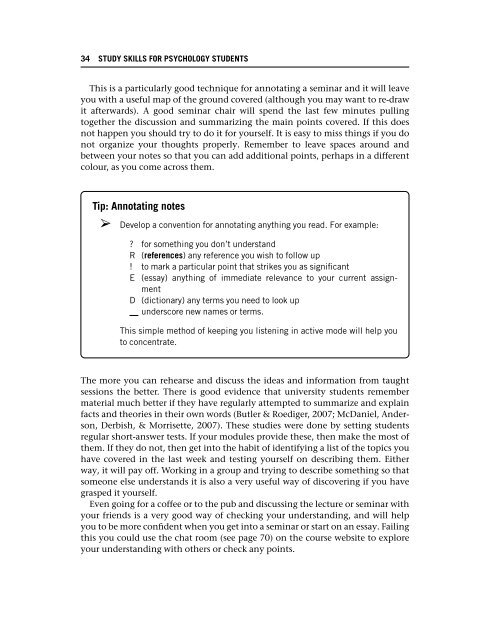Psychology - Forgot your username
Psychology - Forgot your username
Psychology - Forgot your username
Create successful ePaper yourself
Turn your PDF publications into a flip-book with our unique Google optimized e-Paper software.
34 STUDY SKILLS FOR PSYCHOLOGY STUDENTS<br />
This is a particularly good technique for annotating a seminar and it will leave<br />
you with a useful map of the ground covered (although you may want to re-draw<br />
it afterwards). A good seminar chair will spend the last few minutes pulling<br />
together the discussion and summarizing the main points covered. If this does<br />
not happen you should try to do it for <strong>your</strong>self. It is easy to miss things if you do<br />
not organize <strong>your</strong> thoughts properly. Remember to leave spaces around and<br />
between <strong>your</strong> notes so that you can add additional points, perhaps in a different<br />
colour, as you come across them.<br />
Tip: Annotating notes<br />
➢ Develop a convention for annotating anything you read. For example:<br />
? for something you don’t understand<br />
R (references) any reference you wish to follow up<br />
! to mark a particular point that strikes you as significant<br />
E (essay) anything of immediate relevance to <strong>your</strong> current assignment<br />
D (dictionary) any terms you need to look up<br />
underscore new names or terms.<br />
This simple method of keeping you listening in active mode will help you<br />
to concentrate.<br />
The more you can rehearse and discuss the ideas and information from taught<br />
sessions the better. There is good evidence that university students remember<br />
material much better if they have regularly attempted to summarize and explain<br />
facts and theories in their own words (Butler & Roediger, 2007; McDaniel, Anderson,<br />
Derbish, & Morrisette, 2007). These studies were done by setting students<br />
regular short-answer tests. If <strong>your</strong> modules provide these, then make the most of<br />
them. If they do not, then get into the habit of identifying a list of the topics you<br />
have covered in the last week and testing <strong>your</strong>self on describing them. Either<br />
way, it will pay off. Working in a group and trying to describe something so that<br />
someone else understands it is also a very useful way of discovering if you have<br />
grasped it <strong>your</strong>self.<br />
Even going for a coffee or to the pub and discussing the lecture or seminar with<br />
<strong>your</strong> friends is a very good way of checking <strong>your</strong> understanding, and will help<br />
you to be more confident when you get into a seminar or start on an essay. Failing<br />
this you could use the chat room (see page 70) on the course website to explore<br />
<strong>your</strong> understanding with others or check any points.






